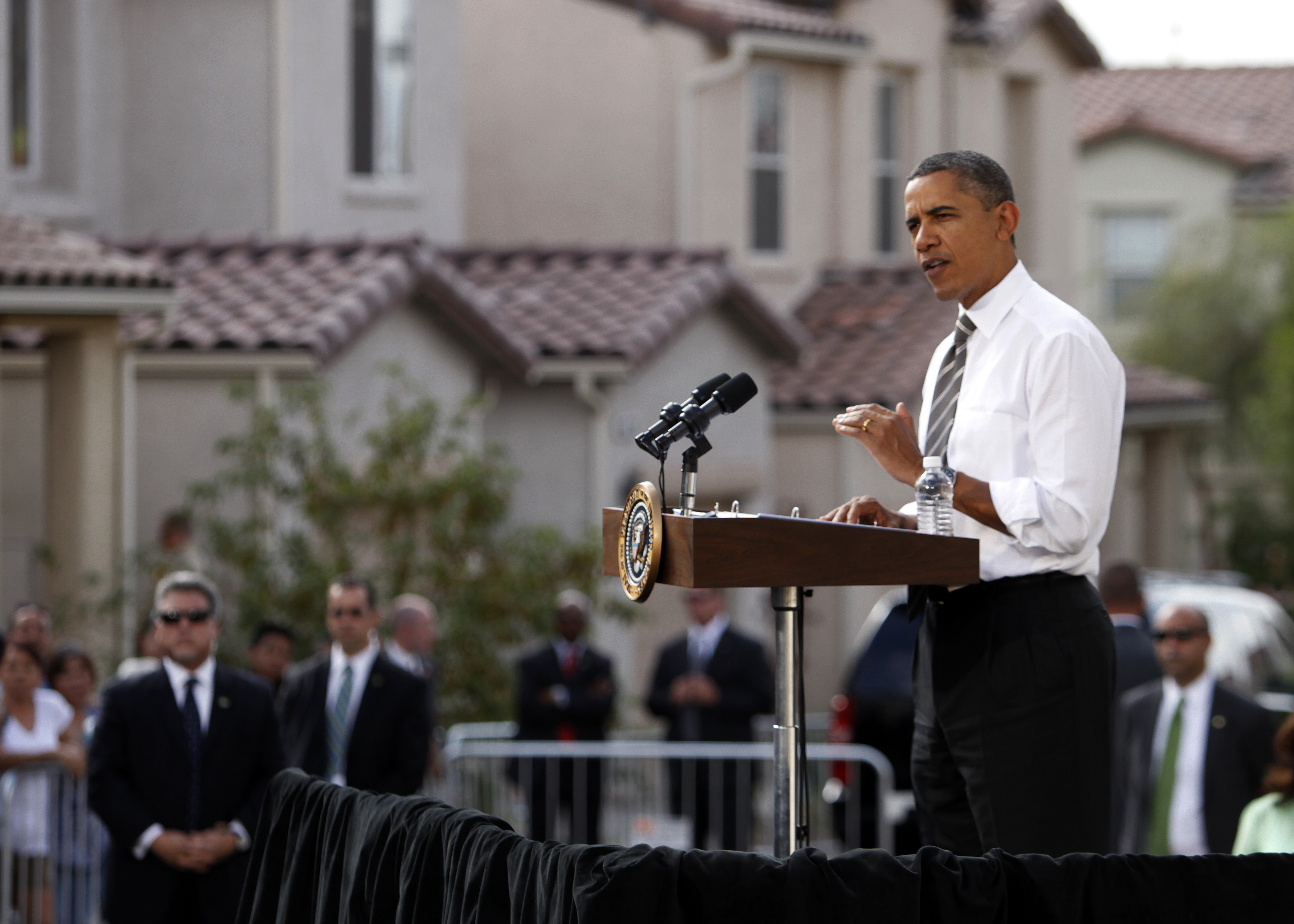This is Obama's biggest failure
He could have used law enforcement to protect homeowners from bank fraud. He didn't.


A free daily email with the biggest news stories of the day – and the best features from TheWeek.com
You are now subscribed
Your newsletter sign-up was successful
In the early 2000s, when the great housing bubble was gaining steam, one hurdle for Wall Street firms who wanted to issue mortgage-backed financial products was the simple reality of the American mortgage market: It was mature. It had been around for decades, its procedures were very well-established, and just about everyone who could reasonably qualify for a loan already had one.
One path mortgage originators took, as most people know by now, is handing out mortgages to anyone who could fog a mirror. But another one was systematic fraud. That is the subject of Chain of Title, a new book by David Dayen about the foreclosure crisis. It's an excellent and absolutely infuriating look at how the American political system, from Barack Obama on down, refused to use enormous legal leverage to help millions of its citizens who were victimized by Wall Street crime. Every American should read this book.
Here's the basic story. Back in the go-go bubble days, originators would issue new mortgages, then quickly sell them to banks, who would package them into mortgage-backed securities. Those securities would often be sliced and diced into new securities (the infamous collateralized debt obligations), and sometimes those would be repackaged again, and so on.
The Week
Escape your echo chamber. Get the facts behind the news, plus analysis from multiple perspectives.

Sign up for The Week's Free Newsletters
From our morning news briefing to a weekly Good News Newsletter, get the best of The Week delivered directly to your inbox.
From our morning news briefing to a weekly Good News Newsletter, get the best of The Week delivered directly to your inbox.
Details aside, the point of securitization was to create lots of new financial products that could be sold to investors. But as the bubble progressed, it was increasingly used to obscure the fact that the securities were full of toxic waste — horrible high-interest loans given to people who could never hope to repay them. (Others were specifically created to implode so that banks like Goldman Sachs could make bets against them.)
A mortgage is a legal document governed by strict laws — not least because it deals with the ownership of land, one of our society's foundation stones. Hence, it is legally required that transfer of ownership be accompanied by meticulous paperwork establishing clearly who owns what.
That may sound obvious — of course one has to have one's mortgage paperwork in order, right? But because of the securities' obscurantist function, and because the mortgage originators were stamping out loans at warp speed, and because banks were rapidly bundling and shuffling the mortgages around, getting the paperwork right would have been a terrific pain in the neck — indeed, a threat to their whole business model.
So Wall Street simply didn't. "Chain of title" refers to documents showing that a mortgage was transferred properly from owner to owner, so the final bank can prove it actually owns the mortgage. A huge fraction of mortgages — probably a large majority — issued during the bubble simply do not have it.
A free daily email with the biggest news stories of the day – and the best features from TheWeek.com
Not many noticed while the bubble was going up, but after it collapsed and the recession took hold, millions of people fell into default on their mortgages. Dayen's book follows three private citizens, Lisa Epstein, Michael Redman, and Lynn Syzmoniak, all of whom were sucked into the foreclosure machine after the economic crash of 2008. In desperation they began poking around their foreclosure documents, and found howling, inconceivable errors — being foreclosed on by a bank that did not own the mortgage, obviously impossible dates, missing signatures, and so on.
They investigated further, and found that their cases were by no means unique, they were just one of the tiny minority of people who bothered to contest their foreclosure. Practically every case they looked at had gargantuan holes in them. Others had it even worse — banks who had foreclosed on people whose mortgages were paid-up, or ones who had no mortgage at all. It turned out the banks had battalions of people committing systematic fraud. "Robo-signers" would attest to "personal knowledge" of homes, or forge others' signatures, or falsely notarize documents, hundreds of times per day. The sheer speed meant that the documents were almost universally garbage, but on the rare instances a foreclosure was challenged, the banks would usually just come back later with a new set that was magically in order.
Epstein, Redman, and Syzmoniak became obsessed with the foreclosure disaster, and they joined with others to agitate for the government to step in and provide relief for homeowners. After awhile, they began to get some traction. All this obvious fraud gave the government enormous leverage. If a bank does not have proper chain of title, it is illegal to foreclose. Since it means the bank does not own the mortgage, it is theft. Under New York law, securities which did not properly follow the original contract (and they usually didn't) would be void. And under federal tax law, income from securities without proper documentation could potentially be taxed at 100 percent. With those tools, the federal government could have easily used the threat of prosecution and taxes to force the banks to the negotiating table.
But a few token gestures aside, the Obama administration was consistently uninterested in the sort of aggressive action that would have halted the foreclosure crisis. Neither the FBI, nor the Department of Justice, nor the IRS ever made the slightest effort bring the banks to heel. They were only concerned with foreclosures insofar as they threatened the financial system. Bringing the massive foreclosure fraud to light would have threatened huge banks' rickety balance sheets — they were, in effect, too big to prosecute, as then-Attorney General Eric Holder all but admitted. And when the state attorneys general pressed a huge lawsuit against the mortgage industry, the administration stepped in, and the result was basically a whitewash — a slap on the wrist fine that reinvigorated the foreclosure machine.
I once argued somewhat hyperbolically that the falling deficit was President Obama's biggest failure, but the foreclosure crisis has the far better case. The law enforcement agencies of the executive branch had tons of power to protect homeowners, and refused to use it on orders from the top. The foreclosure assistance package that was part of the stimulus was even a disaster — largely because, as then-Treasury Secretary Tim Geithner said at the time, the point was to "foam the runway" for the banks. I for one will think twice before buying a house in this country.
Ryan Cooper is a national correspondent at TheWeek.com. His work has appeared in the Washington Monthly, The New Republic, and the Washington Post.
-
 The ‘ravenous’ demand for Cornish minerals
The ‘ravenous’ demand for Cornish mineralsUnder the Radar Growing need for critical minerals to power tech has intensified ‘appetite’ for lithium, which could be a ‘huge boon’ for local economy
-
 Why are election experts taking Trump’s midterm threats seriously?
Why are election experts taking Trump’s midterm threats seriously?IN THE SPOTLIGHT As the president muses about polling place deployments and a centralized electoral system aimed at one-party control, lawmakers are taking this administration at its word
-
 ‘Restaurateurs have become millionaires’
‘Restaurateurs have become millionaires’Instant Opinion Opinion, comment and editorials of the day
-
 The billionaires’ wealth tax: a catastrophe for California?
The billionaires’ wealth tax: a catastrophe for California?Talking Point Peter Thiel and Larry Page preparing to change state residency
-
 ‘Care fractures after birth’
‘Care fractures after birth’instant opinion Opinion, comment and editorials of the day
-
 Bari Weiss’ ‘60 Minutes’ scandal is about more than one report
Bari Weiss’ ‘60 Minutes’ scandal is about more than one reportIN THE SPOTLIGHT By blocking an approved segment on a controversial prison holding US deportees in El Salvador, the editor-in-chief of CBS News has become the main story
-
 Has Zohran Mamdani shown the Democrats how to win again?
Has Zohran Mamdani shown the Democrats how to win again?Today’s Big Question New York City mayoral election touted as victory for left-wing populists but moderate centrist wins elsewhere present more complex path for Democratic Party
-
 Millions turn out for anti-Trump ‘No Kings’ rallies
Millions turn out for anti-Trump ‘No Kings’ ralliesSpeed Read An estimated 7 million people participated, 2 million more than at the first ‘No Kings’ protest in June
-
 Ghislaine Maxwell: angling for a Trump pardon
Ghislaine Maxwell: angling for a Trump pardonTalking Point Convicted sex trafficker's testimony could shed new light on president's links to Jeffrey Epstein
-
 The last words and final moments of 40 presidents
The last words and final moments of 40 presidentsThe Explainer Some are eloquent quotes worthy of the holders of the highest office in the nation, and others... aren't
-
 'Is it even possible to enjoy a trip without contributing to the problem?'
'Is it even possible to enjoy a trip without contributing to the problem?'Instant Opinion Opinion, comment and editorials of the day
